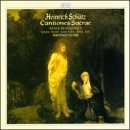| All Artists: Heinrich Schutz, Weser-Renaissance, Manfred Cordes, Mona Spagele, John Potter, Rogers Covey-Crump Title: Heinrich Schütz: Cantiones Sacrae Members Wishing: 0 Total Copies: 0 Label: Cpo Records Release Date: 12/17/1996 Genre: Classical Styles: Opera & Classical Vocal, Historical Periods, Baroque (c.1600-1750) Number of Discs: 2 SwapaCD Credits: 2 UPC: 761203940523 |
Search - Heinrich Schutz, Weser-Renaissance, Manfred Cordes :: Heinrich Schütz: Cantiones Sacrae
 | Heinrich Schutz, Weser-Renaissance, Manfred Cordes Heinrich Schütz: Cantiones Sacrae Genre: Classical
|
Larger Image |
CD Details |
CD ReviewsThe Greatest Modernist of the 17th Century! Giordano Bruno | Wherever I am, I am. | 03/21/2008 (5 out of 5 stars) "The first ten bars of "O bone, o dulcis, o benigne Jesu" - the opening track on this amazing 2-CD performance - will startle most listeners out of any complacency they have about Baroque music being predictable. To portray in harmonies the longing of "miserable man" for divine atonement, Heinrich Schuetz unleashes chord progressions and dissonances that out-shock Shostakovich and out-brazen Berio. Only the madrigals of Carl Gesualdo had ever previously employed such a harmonic fearlessness. If music is the language of the emotions, then Schuetz had an SAT 800 vocabulary, and he squandered all of it in these 40 Sacred Chansons for four solo voices SATB, with continuo added later on just four of them. Schuetz himself never again ventured into such harmonic neverlands, becoming a masterful conservative in his later compositions.
Forty four-part madrigals!?! Who could listen to 110 minutes of that without dropping off? Well, I did, for one. The kaleidoscope of tonalities, abrupt rhythmic changes, evocations of mood that last only seconds, like the facial music of a beautiful child of two and a half, all held my rapt attention through both disks, without even a coffee break. The Weser-Renaissance ensemble, led by Manfred Cordes, has disappointed me on earlier choral CDs. Hence I was reluctant to buy this ten-year-old performance with its rather murky-looking cover art. But my reluctance was misplaced; this is not a choral performance. It's a one-on-a-part rendition by technically superb singers of the highest rank: Bass Peter Kooij, tenor John Potter, soprano Mona Spaegele, and either tenor Rogers Covey-Crump or male alto Ralf Popken on various selections. The alto parts of these motet-madrigals have such extended ranges that it would be nearly impossible for the same singer to sing all of them, so Popken takes the pieces with the higher tessitura, and Covey-Crump the lower. Soprano Mona Spaegele achieves a miracle; she sings with the vibrato-free voce bianca of a gifted male soprano! That's a complimrnt in this case, since it enables her to blend seamlessly with the three male voices. I can't 'hear' the baton of Manfred Cordes anywhere in the music - another compliment, since this polyphony has to sound utterly free in rhythmic rhetoric - yet the ensemble is so close, so precise in articulations that I must believe either in telepathy or brilliant conducting. The Cantiones Sacrae are unusual historically also - texts in Latin, composed by a devout Lutheran working for the most Protestant prince in Europe and dedicated to a mover-and-shaker in the Catholic Hapsburg court in Vienna. This was in 1625! in the very middle of the Thirty Years War. Friends, I realize that I've waxed enthusiastic about several Schuetz performances in recent reviews, but this is a performance you've got to hear. There are several other CDs available of selections from the Cantiones Sacrae, but none of them approach this one in musicianship." |

 Track Listings (20) - Disc #1
Track Listings (20) - Disc #1